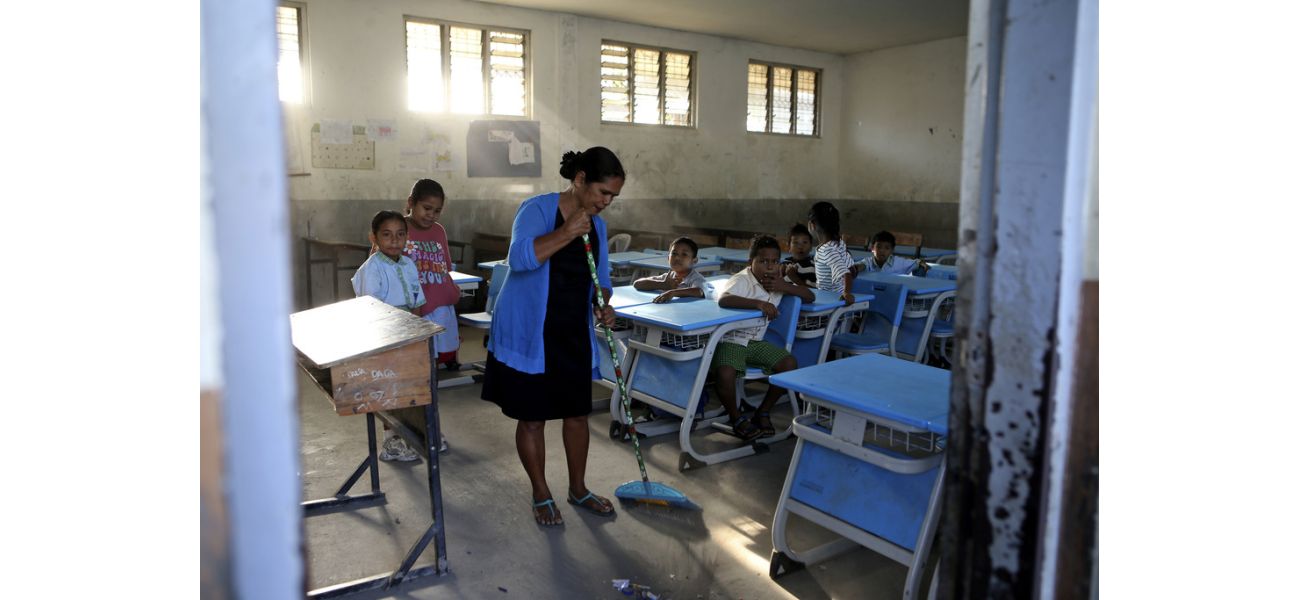The pope's visit to Australia's nearest neighbor explained.
Timor-Leste faced invasion shortly after becoming independent, but now finally receives recognition.
September 8th 2024.

The small nation of Timor-Leste is buzzing with excitement as it prepares for the highly anticipated arrival of Pope Francis. This will be the pontiff's first visit to the deeply Catholic country, coming just after the 25th anniversary of their referendum on independence from Indonesia. Timor-Leste, also known as East Timor, is home to 1.3 million people and is one of the poorest countries in the world. The pope's visit has been met with great anticipation, with banners and billboards lining the streets of the capital city, Dili, to welcome him.
In an interview with The Associated Press, Timor-Leste's President, Jose Ramos-Horta, expressed his enthusiasm for the pope's visit. He believes that it will be a great opportunity to promote the country and put it on the map for tourists. As a former independence fighter and Nobel Peace Prize laureate, Ramos-Horta sees the papal visit as a reward for the unwavering faith of the Timorese people, 98% of whom are Catholic. It is also a recognition of the progress the country has made towards peace in recent years.
In February, the World Bank released a report praising Timor-Leste as a peaceful and democratic nation. Despite occasional tensions between political parties, the country has held free and fair elections for over a decade. However, the road to statehood has been far from easy. In 1975, the Timorese declared their independence from Portugal, only to have it crushed by neighboring Indonesia just nine days later. Over the next 24 years, an estimated 200,000 people lost their lives under Indonesian rule. It wasn't until August 30, 1999, that the Timorese were able to cast their ballots in a referendum backed by the United Nations, which resulted in an overwhelming vote for independence. But this victory was met with violence from Indonesia, resulting in the death of 1,500 people and the destruction of much of Timor-Leste's infrastructure.
An international force led by Australia intervened to restore peace and, after a period of direct UN governance, Timor-Leste finally gained independence on May 20, 2002. However, the transition to democracy has not been without its challenges. The country's leaders have had to grapple with issues such as poverty, unemployment, and corruption. While Timor-Leste's economy is heavily reliant on its energy resources, the depletion of these reserves has resulted in a decline in income from oil and gas. According to the UN Development Program, 42% of the population lives below the poverty line, and unemployment rates are high.
The health sector also faces significant challenges, with nearly half of all children suffering from stunting and high child mortality rates due to malnutrition. The lack of access to essential medicines means that many patients must seek advanced care overseas. Koji Sakane, director of the Global Peacebuilding Association of Japan, notes that achieving national independence and managing a new country is no easy feat, especially for leaders and organizations with little experience in key areas such as political coordination and security.
Despite these challenges, Timor-Leste has made significant strides in recent years. Last month, it joined the World Trade Organization as its 166th member after 7 ½ years of negotiations. The country has also applied for full membership in the Association of Southeast Asian Nations (ASEAN), a regional bloc of 10 countries with a combined population of over 700 million. Timor-Leste currently has observer status, but its leaders see full membership as a crucial step in attracting foreign investment and boosting economic growth. In 2013, ASEAN member states adopted a roadmap for Timor-Leste's full membership, which includes meeting certain financial obligations and building infrastructure to host ASEAN meetings.
Vice Foreign Minister for ASEAN Affairs, Milena Maria da Costa Rangel, is confident that Timor-Leste is on track to become a full member by 2025, under Malaysia's chairmanship. However, economic analyst Fernando Dias Gusmao cautions that the government must move quickly to implement the roadmap and address issues such as inadequate infrastructure. Despite these challenges, there is a sense of optimism in Timor-Leste, and its people are determined to continue working towards a brighter future for their nation.
In an interview with The Associated Press, Timor-Leste's President, Jose Ramos-Horta, expressed his enthusiasm for the pope's visit. He believes that it will be a great opportunity to promote the country and put it on the map for tourists. As a former independence fighter and Nobel Peace Prize laureate, Ramos-Horta sees the papal visit as a reward for the unwavering faith of the Timorese people, 98% of whom are Catholic. It is also a recognition of the progress the country has made towards peace in recent years.
In February, the World Bank released a report praising Timor-Leste as a peaceful and democratic nation. Despite occasional tensions between political parties, the country has held free and fair elections for over a decade. However, the road to statehood has been far from easy. In 1975, the Timorese declared their independence from Portugal, only to have it crushed by neighboring Indonesia just nine days later. Over the next 24 years, an estimated 200,000 people lost their lives under Indonesian rule. It wasn't until August 30, 1999, that the Timorese were able to cast their ballots in a referendum backed by the United Nations, which resulted in an overwhelming vote for independence. But this victory was met with violence from Indonesia, resulting in the death of 1,500 people and the destruction of much of Timor-Leste's infrastructure.
An international force led by Australia intervened to restore peace and, after a period of direct UN governance, Timor-Leste finally gained independence on May 20, 2002. However, the transition to democracy has not been without its challenges. The country's leaders have had to grapple with issues such as poverty, unemployment, and corruption. While Timor-Leste's economy is heavily reliant on its energy resources, the depletion of these reserves has resulted in a decline in income from oil and gas. According to the UN Development Program, 42% of the population lives below the poverty line, and unemployment rates are high.
The health sector also faces significant challenges, with nearly half of all children suffering from stunting and high child mortality rates due to malnutrition. The lack of access to essential medicines means that many patients must seek advanced care overseas. Koji Sakane, director of the Global Peacebuilding Association of Japan, notes that achieving national independence and managing a new country is no easy feat, especially for leaders and organizations with little experience in key areas such as political coordination and security.
Despite these challenges, Timor-Leste has made significant strides in recent years. Last month, it joined the World Trade Organization as its 166th member after 7 ½ years of negotiations. The country has also applied for full membership in the Association of Southeast Asian Nations (ASEAN), a regional bloc of 10 countries with a combined population of over 700 million. Timor-Leste currently has observer status, but its leaders see full membership as a crucial step in attracting foreign investment and boosting economic growth. In 2013, ASEAN member states adopted a roadmap for Timor-Leste's full membership, which includes meeting certain financial obligations and building infrastructure to host ASEAN meetings.
Vice Foreign Minister for ASEAN Affairs, Milena Maria da Costa Rangel, is confident that Timor-Leste is on track to become a full member by 2025, under Malaysia's chairmanship. However, economic analyst Fernando Dias Gusmao cautions that the government must move quickly to implement the roadmap and address issues such as inadequate infrastructure. Despite these challenges, there is a sense of optimism in Timor-Leste, and its people are determined to continue working towards a brighter future for their nation.
[This article has been trending online recently and has been generated with AI. Your feed is customized.]
[Generative AI is experimental.]
0
0
Submit Comment





